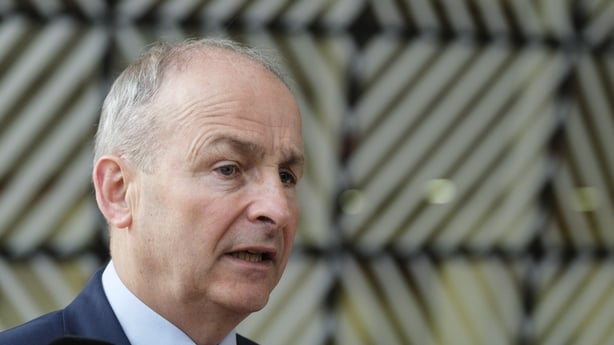Tánaiste Micheál Martin will seek Government permission to draft a bill to change how the Defence Forces are deployed on peacekeeping missions overseas.
The current Triple Lock mechanism only allows for the deployment of more than 12 troops overseas if there is a United Nations mandate, either from the Security Council or General Assembly, alongside Government and Dáil approval.
The Consultative Forum on International Security Policy last June discussed the issue of UN peacekeeping and the Triple Lock.
Under the UN Charter, the Security Council has primary responsibility for the maintenance of international peace and security.
The Security Council may establish a UN peace mission, or authorise action by a group of states or regional organisations, such as the European Union or the African Union.
However, no new peacekeeping mission has been approved by the UN Security Council in a decade.
The five permanent members of the Security Council – China, France, Russia, UK, US – each have a veto on peacekeeping operations.
The Government believes that in practice, this means the threat of a veto by a permanent member, is often enough to prevent the Council from taking action.
The UN General Assembly cannot approve a peacekeeping operation.

The Tánaiste is of the view that there is a growing need to be able to dispatch Irish troops quickly to respond to any crisis where Irish citizens require assistance abroad.
This would require legislative changes, but the Tánaiste will tell colleagues that any deployment would still have to receive Government and Dáil approval.
Mr Martin will also say that it will not change Ireland’s traditional position of military neutrality.
In the case of evacuations of citizens, the Emergency Civil Assistance Team (ECAT) were deployed to Kabul in 2021 and to Sudan in 2023.
The new legislation will look at these types of deployments to provide clarity on the numbers that can be dispatched.
It will also look to simplify authorisation for Ireland to participate in international live military exercises, such as around the EU’s Common Security and Defence Policy.
If the Government approve the drafting of the General Scheme of a bill, the Tánaiste intends to bring legislation to Government in June.
Separately, Minister for Housing Darragh O’Brien will update Cabinet on work to protect the integrity of elections from misinformation and AI manipulation.
He will ask Government to note that An Coimisiún Toghcháin, the Electoral Commission, has published a voluntary framework on Online Electoral Process Information, Political Advertising and Deceptive AI content.
Source link
 TG4 TV PC to TV
TG4 TV PC to TV
